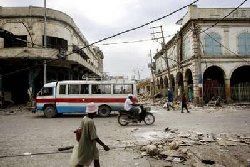Scenes of fighting have broken out in the Haitian capital as survivors continue to have little food and water two weeks after an earthquake devastated the Caribbean island.
Al Jazeera's Monica Villamizar, reporting from the capital Port-au-Prince on Tuesday, saw hundreds of people crowding around several lorries carrying food aid on their way to another location.
People grabbed whatever they could from the lorries and fought each other to carry off bags of food, our correspondent reported.
"The situation here is getting increasingly worse. People are so hungry and the food is just not getting here," she said.
It was difficult to maintain security, she added, in the face of the sea of people trying desperately to get their hands on some food.
Survivor found
Meanwhile on Tuesday, 14 days after the quake, US troops pulled a man alive from under a collapsed building in the capital.
The 31-year-old man had a broken leg and was severely dehydrated, US authorities said.
Outside the wrecked presidential palace, Brazilian UN peacekeeping troops fired tear gas at a frenzied crowd of thousands crowding around a food-handout station.
"They're not violent, just desperate. They just want to eat," Brazilian army Colonel Fernando Soares said. "The problem is there is not enough food for everyone."
Facing persistent complaints by survivors that the huge amounts of aid flown in to Haiti is not reaching them on the ground, US and UN troops, as well as aid workers, have widened and intensified the distribution of food and water.
Al Jazeera's Gabriel Elizondo, also reporting from the capital, said the UN and different aid agencies were trying their best but hundreds of thousands of people were still living in dire conditions.
"Distribution of food comes with enormous logistical problems and when it arrives at a camp, people rush to it and it gets out of hand," our correspondent said.
Jean-Max Bellerive, the Haitian prime minister, admitted on Tuesday that there were still numerous problems with aid delivery and co-ordination.
Despite some of the food handouts turning unruly, however, the UN said the overall security situation in the city remained stable.
"The vast majority of distributions in Haiti are being carried out in an orderly manner. There are isolated, regrettable incidents but these are the exceptions and not the rule," the World Food Program said.
The UN food agency said it has delivered nearly 10 million meals to almost 450,000 people since the quake.
Aftershock
Early in the day, a 4.4-magnitude aftershock shook the country, according to the US Geological Survey.
Haiti has been hit by more than 50 aftershocks since a 7.0-magnitude quake hit the country on January 12, each one bringing fresh trauma to survivors.
The aftershocks, lack of basic supplies and government offers of free transportation out of the battered capital have led to about 236,000 people leaving for the countryside since the quake, but the UN said the exodus has slowed to a trickle, with fewer than 1,000 leaving over the past day.
Alex Larsen, the health minister, said one million Haitians had been displaced from their homes in the wrecked capital and the authorities are trying to relocate at least 400,000 survivors from more than 400 makeshift camps to temporary tent villages outside the city.
The government says it has tents for 400,000 to be used in the temporary settlements, but Rene Preval, Haiti's president, has asked the world to send 200,000 more before the rainy season starts in May.
PHOTO CAPTION
Port-au-Prince is pictured two weeks after the January 12 earthquake in downtown Port-au-Prince, in this United Nations Stabilization Mission in Haiti (MINUSTAH) photograph taken on January 26, 2010.
Al-Jazeera


 Home
Home Discover Islam
Discover Islam Quran Recitations
Quran Recitations Lectures
Lectures
 Fatwa
Fatwa Articles
Articles Fiqh
Fiqh E-Books
E-Books Boys & Girls
Boys & Girls  Ramadan
Ramadan Fatwa Audios
Fatwa Audios Month of Mercy
Month of Mercy Women
Women Eed Al- Fitr
Eed Al- Fitr Food Recipes
Food Recipes Videos
Videos

 Prayer Times
Prayer Times












